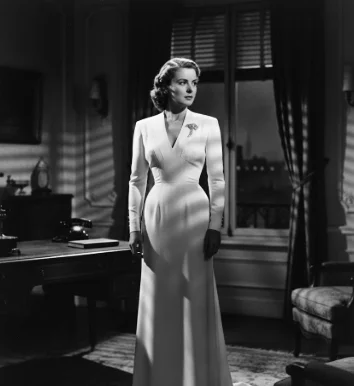Ingrid Bergman was a star of luminous authenticity, an actress whose natural beauty and profound talent set her apart in the glamour-obsessed world of Hollywood’s Golden Age. In a career that spanned five decades and five languages, she became an international icon, celebrated for her ability to convey deep emotional truths on screen.
From her breakout role in Sweden to her immortal performance as Ilsa Lund in Casablanca and her three Academy Award-winning roles, Bergman captivated audiences with a rare combination of vulnerability and strength. Yet, her journey was also one of remarkable resilience, as she famously weathered a career-altering scandal to make one of the most triumphant comebacks in cinema history, cementing her legacy as one of Hollywood’s greatest and most conscientious actresses.
From Stockholm to Stardom
Born in Stockholm, Sweden, on August 29, 1915, Ingrid Bergman’s early life was marked by tragedy. Her German mother died when she was just three, and her father, a photographer who nurtured her creative spirit by constantly filming and photographing her, passed away when she was twelve. Raised by relatives, the shy young Bergman found her voice in performance. After a year at Sweden’s prestigious Royal Dramatic Theater School, she left to pursue a film career, quickly becoming one of her country’s most promising young actresses.
Her international breakthrough came with the Swedish film Intermezzo (1936), which caught the attention of Hollywood producer David O. Selznick. He brought her to America in 1939 to star in an English-language remake of the film. American audiences were immediately captivated by her “Nordic freshness and vitality”. At five feet, ten inches, she was one of Hollywood’s tallest leading ladies, and her natural beauty, which did not depend on heavy makeup, was a stark contrast to the manufactured glamour of the era.
The Golden Age of a Hollywood Queen
Bergman’s career in the 1940s was a string of iconic successes. She starred opposite Humphrey Bogart in the timeless classic Casablanca (1942), a role that cemented her legendary status. She proved her versatility by tackling a wide range of characters, from a devoted governess to a sultry barmaid in Dr. Jekyll and Mr. Hyde (1941).
Her immense talent was quickly recognized by the industry. She earned her first Academy Award for Best Actress for her powerful portrayal of a wife being psychologically manipulated by her husband in Gaslight (1944). She also became a favorite of director Alfred Hitchcock, starring in three of his classic thrillers: Spellbound (1945), the masterful spy film Notorious (1946) with Cary Grant, and Under Capricorn (1949). By the end of the decade, she was the undisputed “undisputed queen” of Hollywood.
Scandal, Exile, and a Triumphant Return
In 1949, at the height of her fame, Bergman’s career took a dramatic turn. Deeply impressed by the work of Italian neorealist director Roberto Rossellini, she wrote him a letter offering her services as an actress. This led to her starring in his film Stromboli (1950) and to a passionate, highly public affair between the two, both of whom were married to other people at the time.
The affair became an international scandal. The American public, who had idolized Bergman for her virtuous on-screen roles as nuns and saints, felt betrayed. She was denounced on the floor of the U.S. Senate as a “powerful influence for evil” and received torrents of hate mail from former fans. Pregnant with Rossellini’s child, she divorced her husband and married the director, effectively entering a period of exile from Hollywood. Her films with Rossellini were largely commercial disappointments in the U.S..
After her marriage to Rossellini ended, Bergman made one of the most remarkable comebacks in film history. In 1956, she returned to American cinema in Anastasia, playing a woman who may be the long-lost Russian grand duchess. The public welcomed her back with open arms, and Hollywood followed suit, awarding her a second Academy Award for Best Actress for the role.
An Enduring Legacy
Ingrid Bergman continued to work on stage and screen for the rest of her life, always challenging herself as an artist. She won a third Oscar, this time for Best Supporting Actress, for her role in Murder on the Orient Express (1974). Her final performance was a powerful portrayal of Israeli Prime Minister Golda Meir in the television movie A Woman Called Golda (1982), which earned her a posthumous Emmy Award.
Bergman passed away from breast cancer on her 67th birthday in 1982. She left behind a legacy defined not only by her radiant beauty and immense talent but also by her courage and resilience. She was a true artist who lived life on her own terms, a woman of substance who fought for her craft and, in doing so, became one of cinema’s most beloved and enduring icons.
